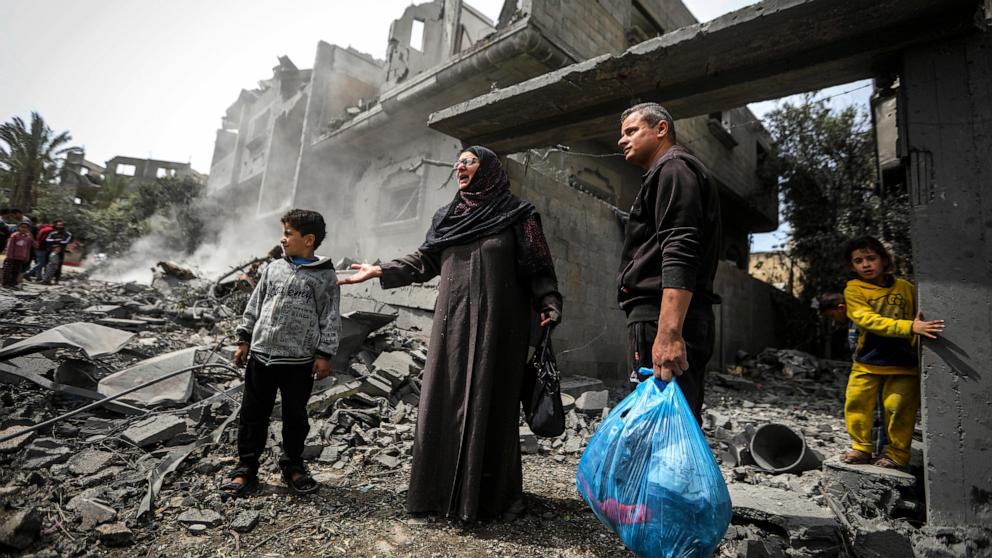A flotilla of three ships has left a port in Cyprus to deliver 400 tonnes of food and other supplies to the Gaza Strip amid growing fears of hunger, an international charity said.
JERUSALEM — A flotilla of three ships left a port in Cyprus on Saturday carrying 400 tons of food and other supplies bound for Gaza, amid growing fears of starvation in the Gaza Strip.
The ships and barges were loaded with enough ready-to-eat foods to prepare more than 1 million meals, including rice, pasta, flour, beans, canned vegetables and protein, according to World Central Kitchen. . It also included dates, which are traditionally eaten to break the daily fast during the holy month of Ramadan.
An Open Arms ship opened a direct route to the Palestinian territories earlier this month, carrying 200 tons of food, water and other aid.
The United Nations and partner countries have warned that famine could break out in the devastated and largely isolated north of Gaza as early as this month. Humanitarian officials argue that sea and air support is not enough and that Israel needs to allow more ground assistance. The United Nations' highest court has ordered Israel to take steps to address the humanitarian crisis, including opening more land routes.
On the other hand, the United States welcomed the establishment of the new Palestinian Authority and indicated that it would accept amendments to the cabinet composition as a step toward political reform.
The Biden administration has called for the “revitalization” of the Palestinian Authority, based in the West Bank, in hopes of taking control of the Gaza Strip once the Israel-Hamas war ends. It is led by Palestinian President Mahmoud Abbas, who appointed US-educated economist Mohammad Mustafa as prime minister earlier this month.
However, both Israel and Hamas (who drove Abbas's security forces out of Gaza in the 2007 occupation) reject the idea of Israel governing Gaza, and Hamas considers the establishment of a new Palestinian government illegitimate. is rejected as such. The authority also has little public support or legitimacy among Palestinians because of its security cooperation with Israel in the West Bank.
The war began on October 7 after Hamas-led militants stormed southern Israel, killing 1,200 people, mostly civilians, and taking about 250 hostages.
More than 400 Palestinians have been killed by Israeli forces and settlers in the West Bank and East Jerusalem since October 7, according to local health authorities. Dr. Fawaz Hamad, director of Al Rajhi Hospital in Jenin, told local station Auda TV that Israeli forces killed a 13-year-old boy in nearby Kabatiya early Saturday morning. The Israeli military said the incident was under investigation.
A major challenge for those managing Gaza will be reconstruction. The nearly six-month war has destroyed hospitals, schools, homes, and critical infrastructure such as roads, sewers, and power grids.
Local health authorities said on Saturday that airstrikes and Israeli ground attacks had killed 32,705 Palestinians, with 82 bodies transferred to hospitals in the past 24 hours. The Gaza Ministry of Health did not distinguish between civilians and combatants in its death toll, but said the majority of those killed were women and children.
Israel says more than a third of the dead were insurgents, but has provided no evidence to support that claim. Hamas blames civilian casualties because it operates in residential areas.
The fighting has displaced more than 80% of Gaza's population and pushed hundreds of thousands to the brink of starvation, according to the United Nations and international aid agencies. The Israeli military said it continued to attack dozens of targets in the Gaza Strip, days after the United Nations Security Council issued its first call for a ceasefire.
Aid also poured into Gaza. During Friday's airdrop, the U.S. military announced it had committed more than 100,000 pounds of aid that day, and nearly 1 million pounds overall, as part of a multilateral effort.
After the war, Israel said it would maintain unrestricted security control over Gaza and partner with Palestinians not affiliated with the Palestinian Authority or Hamas. It is unclear who in Gaza would be willing to take on such a role.
Hamas has warned Palestinians in the Gaza Strip against cooperating with Israel to administer the territory, saying anyone who does so will be treated as a collaborator, which is considered a death threat. Hamas is instead calling on all Palestinian factions to form a power-sharing government ahead of national elections, which have not been held in 18 years.
___
Associated Press writer Menelaos Hadjikostis in Nicosia, Cyprus, contributed to this report.
___
For more of AP's war coverage, visit https://apnews.com/hub/israel-hamas-war.


